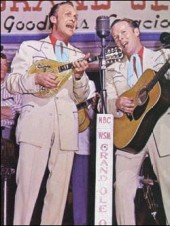In country music’s long tradition of brother duet singing, Ira and Charlie Louvin served as the link between the Delmore Brothers and the Everly Brothers. More important, the Louvin Brothers’ stratospheric vocal interplay made them probably the most influential harmony duet in country music history, touching everybody from Emmylou Harris to the cowpunk band Rank & File.
First cousins of singer-songwriter John D. Loudermilk, Ira and Charlie grew up in a poor farm family in northeastern Alabama, mostly in Henegar. Ira mastered the mandolin, and Charlie picked guitar. Ira and Charlie first performed as the Radio Twins in 1942, worked in Chattanooga with the Foggy Mountain Boys in 1943, and changed their name to the Louvin Brothers in 1947 while working at WROL in Knoxville, because they wanted a professional name that was easier to pronounce and spell. They spent considerable time in Memphis, and they debuted on the Grand Ole Opry in Nashville in 1955.
The Louvins recorded for Apollo in 1947, Decca in 1949, and MGM in 1951 and 1952—their early recording dates were sporadic, in part because of Charlie’s military service in Korea. They did not achieve great commercial success, however, until they began recording for Capitol in September 1952, an affiliation that would continue until the Louvins broke up in August 1963. Although the duo’s biggest hits for Capitol were released in 1955 and 1956, during the early days of rock & roll, their musical style was already defiantly anachronistic. Their high, lonesome harmonies, punctuated by Ira’s stirring mandolin solos, were closer to country music of the 1930s than the honky-tonk or country-pop of the mid-1950s. As a sign of their traditionalism, their first three Top Ten singles, “When I Stop Dreaming,” the chart-topping “I Don’t Believe You’ve Met My Baby,” and “Hoping That You’re Hoping,” didn’t include drums. They mixed gospel and secular forms, often focusing on the traditional themes of family, love, and obligation that link the two.
In the late 1950s a changing market and Ira’s erratic, tempestuous behavior contributed to the brothers’ sinking commercial fortunes. Capitol producer Ken Nelson made several attempts to update the duo’s sound, including an ill-fated series of recordings without Ira’s trademark mandolin, but 1959’s “My Baby's Gone” served as their last Top Ten hit. Increasing personal tensions led to the pair’s 1963 breakup, after which each brother embarked on a separate career. Ira’s 1964 album, The Unforgettable Ira Louvin, which featured electric mandolin and electric guitar, turned out to be his only solo LP; he died in a Missouri car crash on June 20, 1965. Charlie’s solo career began with two Top Ten hits (“I Don’t Love You Anymore” and “See the Big Man Cry”), but through the 1970s and 1980s he became best known as a fixture on weekly Opry broadcasts.
Country-rocker Gram Parsons introduced the Louvins’ songs to the rock world, in several instances as duets with Emmylou Harris. Harris, in turn, reintroduced the Louvins’ material to country audiences when her 1975 version of their song “If I Could Only Win Your Love” became her first Top Ten country hit.
On occasion Charlie has returned to the Louvin Brothers’ duet sound in his own music. Partnering with Charles Whitstein, he undertook a “Louvin Brothers Music Celebration” tour in 1992. In 1996 Watermelon Records released Charlie’s album The Longest Train, on which he was joined by guest performers such as Barry and Holly Tashian and Jim Lauderdale. In 2003 Louvin recorded “I Will Go Sailing No More,” from the movie Toy Story, for a Walt Disney CD, O Mickey, Where Art Thou? Also in 2003 artists such as James Taylor, Patty Loveless, Merle Haggard, and Dolly Parton paid tribute to the Louvins on the Universal South CD Livin’, Lovin’, Losin’: Songs of the Louvin Brothers. Rock group Cake persuaded Charlie to join their 2003 national tour, also featuring Cheap Trick. - Jimmy Guterman
